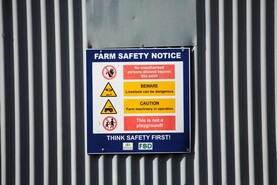Fatigue is something that so many farmers are familiar with that they simply label it as tiredness, but it can be far more complex than this. In essence, it is a decline in your physical or mental performance which can pose a major increase in accidents on farm, be they serious or not. Long working hours and an increased workload, particularly around an extended working day during calving, lambing, and harvest time combined with a lack of sleep owing to simply not going to bed in time, broken sleep from checking stock at night or lack of quality sleep due to being unable to wind down properly, all put farmers at risk of fatigue.
A study conducted by DCU in 2023 highlighted just how serious an issue it is in farming, with the key findings of the study being:
Irish farmers reported frequent burnout (24%) and widespread sleep issues (50%).Burnt out farmers reported severe sleep issues.Burnt out farmers reported worse mental and physical health.Farmers with sleep issues reported worse mental and physical health.Older farmers and those with children were especially at risk of burnoutThe HSA listed five questions for farmers and farm workers to ask themselves to recognise and combat fatigue in farming.
1. How alert am I?
An alert mind will see risks, help you to react quickly and make better decisions. Try to notice your own fatigue and talk about it with others. It will help you recognise when you need to change what you are doing, eg stopping, slowing down, taking a break.
2. Am I getting good sleep?
Sleep is essential for thinking clearly and for our physical and emotional health. Recording sleep patterns and discussing sleep with others can inform small changes you could make to your sleep. Short naps of around 20 minutes may provide a temporary energy boost, but allow time to regain alertness before engaging in safety-critical work.
3. What time is it versus risk?
Be aware that your alertness tends to be lowest at the end of a working day or at nighttime (between 2am and 6am). Allow yourself sufficient time to complete tasks safely. It may not be your preference to ‘take your time’, but choosing to purposefully work slower at particular times of day/night can prove to be a safer temporary measure.
4. Can I get help with workload?
Investing in farm labour can be an investment in your own health and safety. Upfront costs may increase but this is an insurance against the financial impacts of incidents, serious injuries and fatalities.
5. How do I look after others on my farm?
Consider the working hours and demands placed on others working on your farm. Ensure that good communication between you and other farm workers about health and safety is a priority.
Fatigue is something that so many farmers are familiar with that they simply label it as tiredness, but it can be far more complex than this. In essence, it is a decline in your physical or mental performance which can pose a major increase in accidents on farm, be they serious or not. Long working hours and an increased workload, particularly around an extended working day during calving, lambing, and harvest time combined with a lack of sleep owing to simply not going to bed in time, broken sleep from checking stock at night or lack of quality sleep due to being unable to wind down properly, all put farmers at risk of fatigue.
A study conducted by DCU in 2023 highlighted just how serious an issue it is in farming, with the key findings of the study being:
Irish farmers reported frequent burnout (24%) and widespread sleep issues (50%).Burnt out farmers reported severe sleep issues.Burnt out farmers reported worse mental and physical health.Farmers with sleep issues reported worse mental and physical health.Older farmers and those with children were especially at risk of burnoutThe HSA listed five questions for farmers and farm workers to ask themselves to recognise and combat fatigue in farming.
1. How alert am I?
An alert mind will see risks, help you to react quickly and make better decisions. Try to notice your own fatigue and talk about it with others. It will help you recognise when you need to change what you are doing, eg stopping, slowing down, taking a break.
2. Am I getting good sleep?
Sleep is essential for thinking clearly and for our physical and emotional health. Recording sleep patterns and discussing sleep with others can inform small changes you could make to your sleep. Short naps of around 20 minutes may provide a temporary energy boost, but allow time to regain alertness before engaging in safety-critical work.
3. What time is it versus risk?
Be aware that your alertness tends to be lowest at the end of a working day or at nighttime (between 2am and 6am). Allow yourself sufficient time to complete tasks safely. It may not be your preference to ‘take your time’, but choosing to purposefully work slower at particular times of day/night can prove to be a safer temporary measure.
4. Can I get help with workload?
Investing in farm labour can be an investment in your own health and safety. Upfront costs may increase but this is an insurance against the financial impacts of incidents, serious injuries and fatalities.
5. How do I look after others on my farm?
Consider the working hours and demands placed on others working on your farm. Ensure that good communication between you and other farm workers about health and safety is a priority.






 This is a subscriber-only article
This is a subscriber-only article










SHARING OPTIONS: